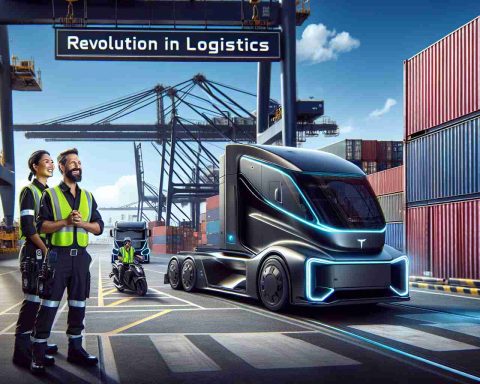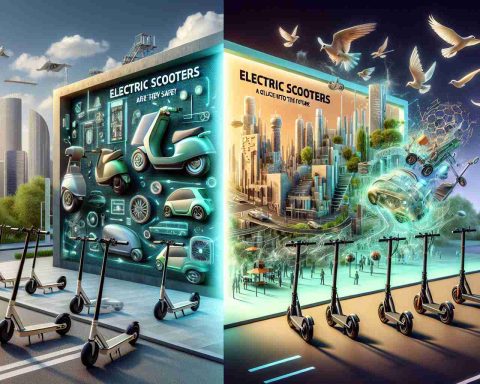A New Era of Electric Mobility
Europe is on the brink of a major transformation in the realm of commercial transportation, driven by the rapid adoption of electric vehicles. The latest data from the International Council on Clean Transportation (ICCT) highlights a significant shift towards electrification, as traditional manufacturers recalibrate their strategies to cater to evolving market demands and stringent environmental regulations.
The Pioneers of Electrification
In a stunning industry sweep, Volvo has ascended to the top in the heavy-duty electric truck arena, capitalizing on a 36% market share. Meanwhile, Iveco has made considerable headway in smaller trucks, demonstrating their agility in a competitive landscape. Leading the charge in passenger transport, Daimler Buses has solidified its leadership, boasting advancements that keep it at the forefront of bus technology.
Evolving Market Dynamics
The third quarter of 2024 marked a pivotal moment, with nearly 2,900 zero-emission vehicles hitting the roads, a notable 42% increase in heavy-duty registrations. Despite an overall dip in total truck registrations, the commitment to clean technology remains strong, reflecting a selective but powerful market transition.
Embracing Change and Innovation
The pressure is mounting as emissions regulations tighten across Europe. Companies are responding with groundbreaking advancements in battery technology, striving to balance cost-efficiency with the promise of reduced emissions.
Unveiling the future, expectation runs high for a sustained climb in electric vehicle adoption, fueled by technological progress and progressive government policies. With infrastructure developments on the horizon, the road ahead looks bright for sustainable transit solutions.
As we stand on the cusp of a new era, the landscape of transportation is undeniably shifting, steering towards a cleaner, greener tomorrow.
The Future of Electric Trucks: Trends, Insights, and Innovations
Understanding the Electric Vehicle (EV) Transition
The global transportation sector is undergoing a transformative shift towards electrification. With an emphasis on sustainable mobility, Europe is setting the pace, driven by a combination of market forces and regulatory pressures pushing for lower emissions. This transition is creating new opportunities and challenges across various vehicle categories, including trucks and buses.
Key Innovations in Electric Truck Technology
A focal point for electric vehicle manufacturers is the advancement in battery technology. Innovations are aimed at enhancing energy density, reducing charging times, and extending vehicle range. These improvements are crucial for the adoption of electric trucks, especially in the logistics sector, where downtime can significantly impact operational efficiency.
Pros and Cons of Electric Trucks
Pros:
– Environmental Benefits: Electric trucks produce zero emissions during operation, significantly reducing the carbon footprint compared to diesel-powered counterparts.
– Lower Operating Costs: Reduced dependence on fossil fuels and lower maintenance requirements contribute to long-term cost savings.
– Quieter Operations: Electric motors produce less noise, which is advantageous for urban deliveries and reducing noise pollution.
Cons:
– High Initial Costs: The upfront investment for electric trucks is higher than for traditional vehicles, primarily due to battery costs.
– Limited Charging Infrastructure: While improving, the existing charging network still poses limitations for long-haul routes.
– Range Limitations: Although improving, electric trucks currently offer less range per charge compared to diesel trucks, affecting their viability for certain applications.
Market Analysis: Trends and Predictions
Rising Electric Truck Adoption
Data from ICCT reveals a continuous rise in zero-emission vehicle registrations, highlighting increasing confidence in the market. The expansion of electric trucks and their penetration in new segments underscores a growing commitment from traditional and new automotive players to electrify vehicle fleets.
Government Policies and Sustainability
Supportive government policies, including subsidies and incentives for electric vehicle purchases, significantly accelerate market adoption. Regulations tightening emissions and promoting sustainability drive manufacturers to innovate and deliver greener solutions.
Limitations and Barriers to Entry
Despite positive trends, the electric vehicle industry faces challenges like material sourcing for batteries. Ethical and sustainable sourcing of materials such as lithium and cobalt is crucial to avoid supply chain controversies and ensure truly sustainable practices.
The Road Ahead: Predictions for the Electric Truck Market
Looking ahead, the electric truck market is expected to grow steadily, with technological advancements and infrastructure improvements key to overcoming current limitations. Stakeholders in the transport industry must collaborate to achieve a seamless transition to electric mobility, positioning the continent for a cleaner and more sustainable future.
This pivotal moment in the transport industry is not just a shift in vehicle type but a broader paradigm change emphasizing sustainability and innovation. The commitment to electrification exemplifies the move towards a more environmentally conscious future.


















